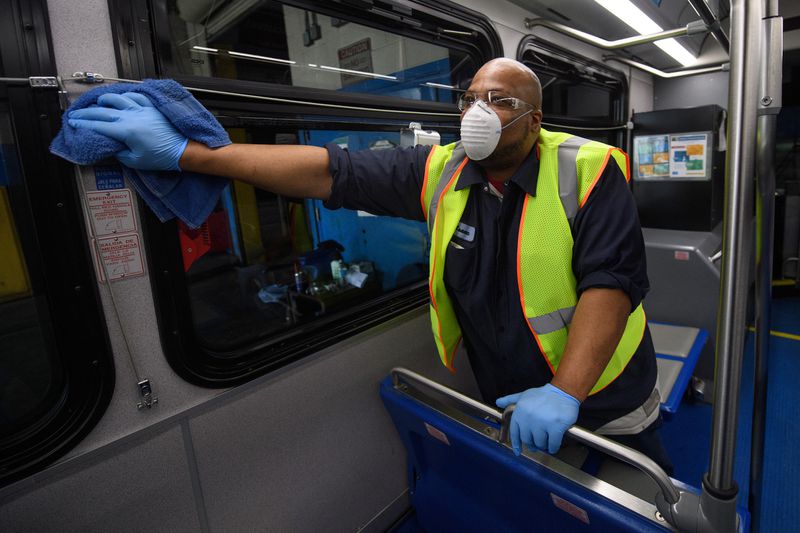
An essential part of a Vibrant NWI is the provision of transit services. Transit workers, such as Isaac Sutton of Gary Public Transportation Corporation (GPTC) pictured here, are across the country on the front lines of the effort to keep Americans safe from COVID-19. The nature of transit requires close  contact with the public - social distancing is nearly impossible. However, for many, transit is an essential service: a requirement to get to necessary medical appointments, groceries, or a workplace that hasn’t been quarantined. Transit operators are stuck with a difficult choice: shut down operations and limit exposure of transit employees and passengers and limit the spread of the virus, or maintain operations to keep individuals’ access to essential services.
contact with the public - social distancing is nearly impossible. However, for many, transit is an essential service: a requirement to get to necessary medical appointments, groceries, or a workplace that hasn’t been quarantined. Transit operators are stuck with a difficult choice: shut down operations and limit exposure of transit employees and passengers and limit the spread of the virus, or maintain operations to keep individuals’ access to essential services.
As of Tuesday, March 31st, Porter County Aging and Community Resources (PCACS) is the only transit operator to shut down operations completely. PCACS took detailed care to make sure that riders that relied on PCACS for routine and required medical trips, such as dialysis patients, had other transportation options before shutting down operations. PCACS continues to assist riders and clients in accessing transportation throughout the COVID-19 crisis. The City of Valparaiso has shut down two of their three transit operations, the ChicaGo Dash and the South Shore Connect, but maintains operations of the V-Line with added cleaning and disinfecting procedures and requires all employees and riders to wear a medical mask and gloves while using their services.
Opportunity Enterprises and Lake County Community Services have suspended all transportation services except for trips to required medical services. North Township Dial-a-Ride has shut down their transit services, but are subsidizing trips through a third-party transporter for essential services. LaPorte has reduced hours, and waived fares. All have added additional cleaning procedures for their vehicles.
Michigan City Transit (MCT) has suspended all fares for their service, making trips free for anyone who still needs to take the bus. MCT has also taken the added precaution of limiting only 15 passengers per bus and encouraging the public to only use the bus for essential services only. MCT has also provided employees with personal protective equipment and an enhanced cleaning regimen.
Gary Public Transit Corporation (GPTC) and East Chicago Transit (ECT) have made no changes to their services, however both operators are using significant resources to add additional disinfecting and cleaning procedures to both the end-of-service bus maintenance procedure and throughout the day as well.
The South Shore Line (SSL) is the largest regional provider of transit and has taken the most dramatic steps to curbing the spread of the virus. Weekday and Weekend service on the SSL has essentially been cut in half. This allows NICTD leadership to use enhanced cleaning procedures on rail cars that are not currently in-use and also keep a quarantined employee-pool to maintain services in case of employee shortages. Additionally, the SSL is using the reduction in ridership and services to get ahead of its regular maintenance schedule.
GPTC and the SSL spearheaded a weekly regional transit conference call for all transit operators to share best practices and news concerning transit. Recently, the federal government announced an emergency aid package to assist transit operators with the loss of fare revenue and the added expense of emergency safety procedures implemented by transit operators. Transit operators across the country are expected to get $25 Billion in relief aid. NIRPC and regional transit operators are closely monitoring the situation to secure part of that funding for Northwestern Indiana.
